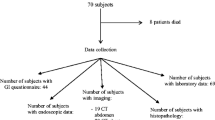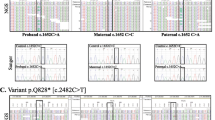Abstract
Tricho-hepato-enteric syndrome (THES) (OMIM #222,470) is a rare autosomal recessive syndromic enteropathy whose primary manifestations are dysmorphism, intractable diarrhea, failure to thrive, hair abnormalities, liver disease, and immunodeficiency with low serum IgG concentrations. THES is caused by mutations of either Tetratricopeptide Repeat Domain 37 (TTC37) or Ski2 like RNA Helicase (SKIV2L), genes that encode two components of the human SKI complex. Here, we report a patient with a TTC37 homozygous mutation phenotypically typical for tricho-hepato-enteric syndrome in whom extremely elevated IgM with low IgG was present at the time of diagnosis. These manifestations were not previously described in THES patients and this raised our index of suspicion towards “atypical” hyper IgM syndrome. Although the pathogenesis of immunoglobulin production dysfunction in THES is still elusive, this disorder should be considered in the differential diagnosis in patients with elevated IgM and syndromic features.

Similar content being viewed by others
References
Bourgeois P, Esteve C, Chaix C, et al. Tricho-Hepato-Enteric Syndrome mutation update: mutations spectrum of TTC37 and SKIV2L, clinical analysis and future prospects. Hum Mutat. 2018;39:774–89. https://doi.org/10.1002/humu.23418.
Vély F, Barlogis V, Marinier E, Coste M-E, Dubern B, Dugelay E, Lemale J, Martinez-Vinson C, Peretti N, Perry A, Bourgeois P, Badens C, Goulet O, Hugot J-P, Farnarier C, Fabre A. Combined immunodeficiency in patients with trichohepatoenteric syndrome. Front Immunol. 2018;9:1036. https://doi.org/10.3389/fimmu.2018.01036.
Yazdani R, Fekrvand S, Shahkarami S, Azizi G, Moazzami B, Abolhassani H, Aghamohammadi A. The hyper IgM syndromes: epidemiology, pathogenesis, clinical manifestations, diagnosis and management. Clin Immunol. 2019;198:19–30. https://doi.org/10.1016/j.clim.2018.11.007.
Alsaleem BM, Hasosah M, Ahmed ABM, Al Hatlani MM, Alanazi AH, Al-Hussaini A, Asery AT, Alghamdi KA, AlRuwaithi MM, Khormi MAM, Al Sarkhy A, Alshamrani AS. Tricho-hepato-enteric syndrome: retrospective multicenter experience in Saudi Arabia. Saudi J Gastroenterol. 2021. https://doi.org/10.4103/sjg.sjg_200_21
Gallo V, Cirillo E, Prencipe R, Lepore A, Del Vecchio L, Scalia G, Martinelli V, Di Matteo G, Saunders C, Durandy A, Moschese V, Leonardi A, Giardino G, Pignata C. Clinical, immunological, and functional characterization of six patients with very high IgM levels. J Clin Med. 2020;9(3):818. https://doi.org/10.3390/jcm9030818.
Uhlen M, Karlsson MJ, Zhong W, Tebani A, Pou C, Mikes J, Lakshmikanth T, Forsström B, Edfors F, Odeberg J, Mardinoglu A, Zhang C, von Feilitzen K, Mulder J, Sjöstedt E, Hober A, Oksvold P, Zwahlen M, Ponten F, Lindskog C, Sivertsson Å, Fagerberg L, Brodin P. A genome-wide transcriptomic analysis of protein-coding genes in human blood cells. Science. 2019;366(6472):eaax9198. https://doi.org/10.1126/science.aax9198.
Baxter SK, Walsh T, Casadei S, Eckert MM, Allenspach EJ, Hagin D, Segundo G, Lee MK, Gulsuner S, Shirts BH, Sullivan KE, Keller MD, Torgerson TR, King MC. Molecular diagnosis of childhood immune dysregulation, polyendocrinopathy, and enteropathy, and implications for clinical management. J Allergy Clin Immunol. 2022;149(1):327–339. https://doi.org/10.1016/j.jaci.2021.04.005
Fabre A, Breton A, Coste ME, Colomb V, Dubern B, Lachaux A, Lemale J, Mancini J, Marinier E, Martinez-Vinson C, Peretti N, Perry A, Roquelaure B, Venaille A, Sarles J, Goulet O, Badens C. Syndromic (phenotypic) diarrhoea of infancy/tricho-hepato-enteric syndrome. Arch Dis Child. 2014;99(1):35–8. https://doi.org/10.1136/archdischild-2013-304016.
Broides A, Nahum A, Mandola AB, Rozner L, Pinsk V, Ling G, Yerushalmi B, Levy J, Givon-Lavi N. Incidence of typically severe primary immunodeficiency diseases in consanguineous and non-consanguineous populations. J Clin Immunol. 2017;37(3):295–300. https://doi.org/10.1007/s10875-017-0378-6.
Rider Boisson B, Jyonouchi S, Hanson EP, Rosenzweig SD, Cassanova J-L, Orange JS. Novel TTC37 mutations in a patient with immunodeficiency without diarrhea: extending the phenotype of trichohepatoenteric syndrome. Front Pediatr. 2015;3:2–2. https://doi.org/10.3389/fped.2015.00002.
KaracaEdeer N, Aykut A, Pariltay E, Aksu G, Cogulu O, Kutukculer N. A novel TTC37 mutation causing clinical symptoms of trichohepatoenteric syndrome such as pyoderma gangrenosum and immunodeficiency without severe diarrhea. J Investig Allergol Clin Immunol. 2019;29(5):396–8. https://doi.org/10.18176/jiaci.0418.
Lee WI, Huang JL, Chen CC, Lin JL, Wu RC, Jaing TH, Ou LS. Identifying mutations of the Tetratricopeptide Repeat Domain 37 (TTC37) gene in infants with intractable diarrhea and a comparison of Asian and non-Asian phenotype and genotype: a global case-report study of a well-defined syndrome with immunodeficiency. Medicine (Baltimore). 2016;95(9):e2918. https://doi.org/10.1097/MD.0000000000002918.
Acknowledgements
The work of GS is supported in part by the Israel Ministry of Aliyah and Integration.
Author information
Authors and Affiliations
Contributions
All the authors contributed to the study conception and design. Material preparation, and data collection and analysis were performed by EK, AN, GL, GS, and AB. Genetic analysis was performed by MES, NH, OP, and OB. The first draft of the manuscript was written by EK and all the authors commented on previous versions of the manuscript. All the authors read and approved the final manuscript.
Corresponding author
Ethics declarations
Ethics approval
This study was approved by the institutional review board of Soroka University Medical Center.
Consent to participate
The parents signed written informed consents approving participation in the study.
Consent for publication
All the authors gave their consent to publish this manuscript.
Conflict of interest
The authors declare no competing interests.
Additional information
Publisher's note
Springer Nature remains neutral with regard to jurisdictional claims in published maps and institutional affiliations.
Rights and permissions
About this article
Cite this article
Kristal, E., Nahum, A., Ling, G. et al. Hyper IgM in tricho-hepato-enteric syndrome due to TTC37 mutation. Immunol Res 70, 775–780 (2022). https://doi.org/10.1007/s12026-022-09305-9
Received:
Accepted:
Published:
Issue Date:
DOI: https://doi.org/10.1007/s12026-022-09305-9




